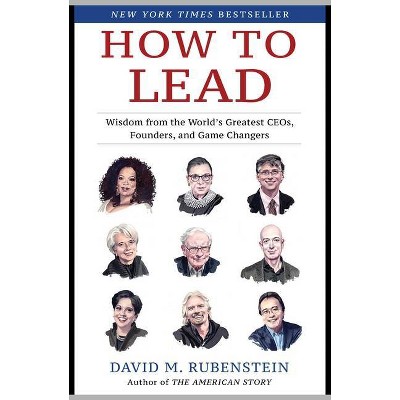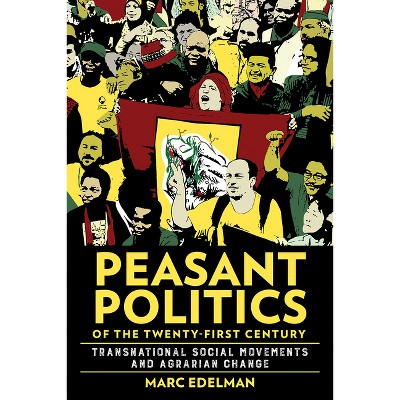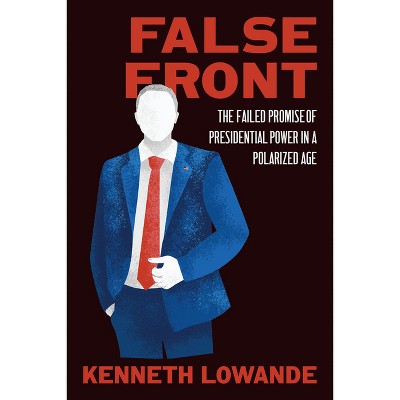Sponsored

Why Washington Won't Work - (Chicago Studies in American Politics) by Marc J Hetherington & Thomas J Rudolph (Paperback)
$30.00
In Stock
Eligible for registries and wish lists
Sponsored
About this item
Highlights
- Polarization is at an all-time high in the United States.
- About the Author: Marc J. Hetherington is professor of political science at Vanderbilt University.
- 256 Pages
- Political Science, American Government
- Series Name: Chicago Studies in American Politics
Description
About the Book
Major polls all report that "trust in government is at an all-time low" in the United States. At the same time, polarization is at an all-time high. Hetheringon and Rudolph's timely book demonstrates a direct link between polarization and the decline of political trust in America. And it's not just legislators and party leaders who are polarized, but ordinary Americans. Drawing on a cornucopia of evidence and data, the authors show that since the early 2000s polarization in the electorate has increasingly been rooted not in ideological or policy differences, but, for the first time, in extremely negative feelings toward the other party. To an unprecedented degree, Republicans and Democrats simply do not like each other. These polarized feelings are central to why trust in government has polarized which, in turn, is central to "why Washington won't work." On most issues, presidents and other party leaders can convince their own party faithful in the electorate to support their positions. In order to pass legislation, however, a public consensus is needed to push policymakers toward action. Some proportion of the out-party partisans and independents have to have enough trust in government to make an ideological sacrifice and form that consensus. As the authors persuasively explain, this is no longer occurring. Far from being a long-term and relatively stable psychological trait, political trust is highly variable and contingent. Whether or not one trusts government will vary depending on whether one's party is in control, what part of government one is referring to, and what policies or events are most salient. Political trust increases, for example, when the public identifies international issues as most important (as during the 1950s and 60s). They also find that the effects of economic performance on political trust are asymmetric: weak economies harm trust more than strong economies help it. Ultimately, Hetherington and Rudolph have to conclude that it is unlikely political trust will ever to return to 1960s levels (a high point in the US) for any length of time unless international concerns again dominate politics and, just as important, the economy becomes consistently strong.Book Synopsis
Polarization is at an all-time high in the United States. But contrary to popular belief, Americans are polarized not so much in their policy preferences as in their feelings toward their political opponents: To an unprecedented degree, Republicans and Democrats simply do not like one another. No surprise that these deeply held negative feelings are central to the recent (also unprecedented) plunge in congressional productivity. The past three Congresses have gotten less done than any since scholars began measuring congressional productivity. In Why Washington Won't Work, Marc J. Hetherington and Thomas J. Rudolph argue that a contemporary crisis of trust--people whose party is out of power have almost no trust in a government run by the other side--has deadlocked Congress. On most issues, party leaders can convince their own party to support their positions. In order to pass legislation, however, they must also create consensus by persuading some portion of the opposing party to trust in their vision for the future. Without trust, consensus fails to develop and compromise does not occur. Up until recently, such trust could still usually be found among the opposition, but not anymore. Political trust, the authors show, is far from a stable characteristic. It's actually highly variable and contingent on a variety of factors, including whether one's party is in control, which part of the government one is dealing with, and which policies or events are most salient at the moment. Political trust increases, for example, when the public is concerned with foreign policy--as in times of war--and it decreases in periods of weak economic performance. Hetherington and Rudolph do offer some suggestions about steps politicians and the public might take to increase political trust. Ultimately, however, they conclude that it is unlikely levels of political trust will significantly increase unless foreign concerns come to dominate and the economy is consistently strong.Review Quotes
"Hetherington and Rudolph argue that a profound, and historically high, lack of trust among the public reduces the likelihood of compromise in Congress. In an increasingly polarized political environment that is already predisposed to gridlock, this finding on public trust helps to further explain the inability of Washington to govern, effectively legislate, and work."-- "New Books in Political Science" (11/16/2015 12:00:00 AM)
"Hetherington and Rudolph's careful statistical analysis of public opinion expands the understanding of the role of political trust in the governing process by treating it as a cause rather than a consequence of public policy. . . . Highly recommended."-- "Choice" (4/25/2016 12:00:00 AM)
"Why Washington Won't Work is a marvelous book. Hetherington and Rudolph have written a compelling and smoothly accessible work that reveals more about the troubled condition of American politics than any presidential campaign tome--and they have accomplished this while maintaining the most rigorous methodological standards of political science."--David Maraniss, author of First in His Class: A Biography of Bill Clinton and Barack Obama: The Story
"Why Washington Won't Work makes a substantial contribution to our understanding of the roots of dysfunction in American government. Hetherington and Rudolph present a highly convincing case that the partisan polarization of the mass public has contributed to the problem by polarizing trust in government. Their creative and persuasive analysis reveals many new insights into the vital role of trust in government for explaining why the public supports or opposes government action and how we might seek solutions."--Stephen Nicholson, University of California, Merced
"Hetherington and Rudolph's Why Washington Won't Work zeroes in on the affective component of polarized politics: Republicans and Democrats not only disagree on issues, they also just don't like one another. Mutual antipathy undermines trust, which inhibits the deal-making essential to governing under our Madisonian system. This cogent and well-supported argument helps to explain why gridlock and stalemate have become the new normal."--Gary Jacobson, University of California, San Diego
"Hetherington and Rudolph marshal a massive array of evidence to show that political trust guides American political life, particularly when the public is focused on international affairs. The book is a mammoth contribution, and it is likely to be influential for decades."--Jason Barabas, Stony Brook University
About the Author
Marc J. Hetherington is professor of political science at Vanderbilt University. He is the author of Why Trust Matters and coauthor, with Jonathan D. Weiler, of Authoritarianism andPolarization in American Politics. Thomas J. Rudolph is professor of political science at the University of Illinois at Urbana-Champaign and coauthor of Expression vs. Equality.Dimensions (Overall): 9.01 Inches (H) x 6.13 Inches (W) x .59 Inches (D)
Weight: .96 Pounds
Suggested Age: 22 Years and Up
Number of Pages: 256
Genre: Political Science
Sub-Genre: American Government
Series Title: Chicago Studies in American Politics
Publisher: University of Chicago Press
Theme: National
Format: Paperback
Author: Marc J Hetherington & Thomas J Rudolph
Language: English
Street Date: September 14, 2015
TCIN: 1006743999
UPC: 9780226299211
Item Number (DPCI): 247-12-6517
Origin: Made in the USA or Imported
If the item details aren’t accurate or complete, we want to know about it.
Shipping details
Estimated ship dimensions: 0.59 inches length x 6.13 inches width x 9.01 inches height
Estimated ship weight: 0.96 pounds
We regret that this item cannot be shipped to PO Boxes.
This item cannot be shipped to the following locations: American Samoa (see also separate entry under AS), Guam (see also separate entry under GU), Northern Mariana Islands, Puerto Rico (see also separate entry under PR), United States Minor Outlying Islands, Virgin Islands, U.S., APO/FPO
Return details
This item can be returned to any Target store or Target.com.
This item must be returned within 90 days of the date it was purchased in store, shipped, delivered by a Shipt shopper, or made ready for pickup.
See the return policy for complete information.
Frequently bought together
Trending Non-Fiction

$19.31
was $20.98 New lower price
4 out of 5 stars with 65 ratings

$18.28
was $19.58 New lower price
4.7 out of 5 stars with 17 ratings

$4.59
MSRP $7.99
Buy 2, get 1 free select books
4.8 out of 5 stars with 123 ratings

$6.20
MSRP $10.95
Buy 2, get 1 free select books
4.8 out of 5 stars with 33 ratings

$7.09
MSRP $9.99
Buy 2, get 1 free select books
4.9 out of 5 stars with 46 ratings












